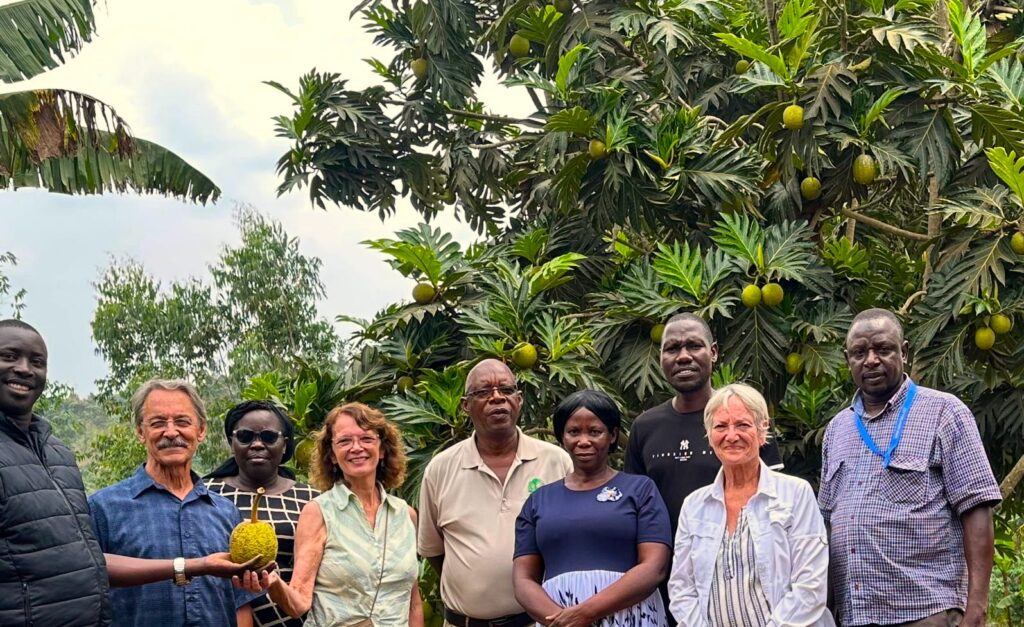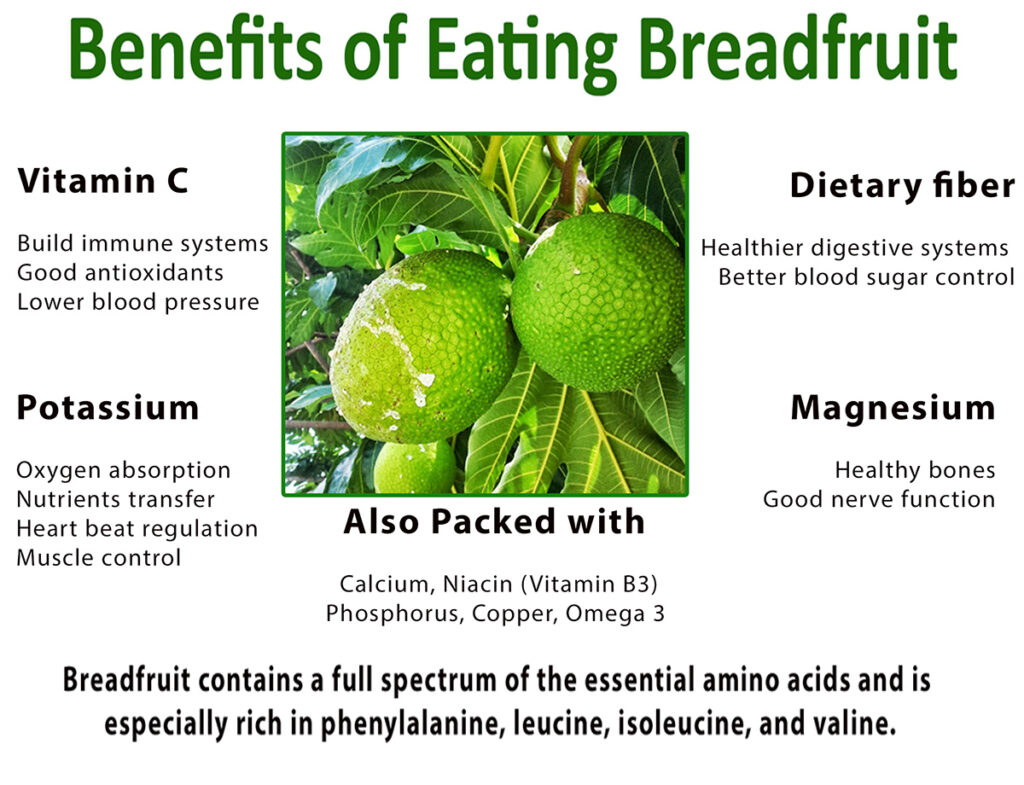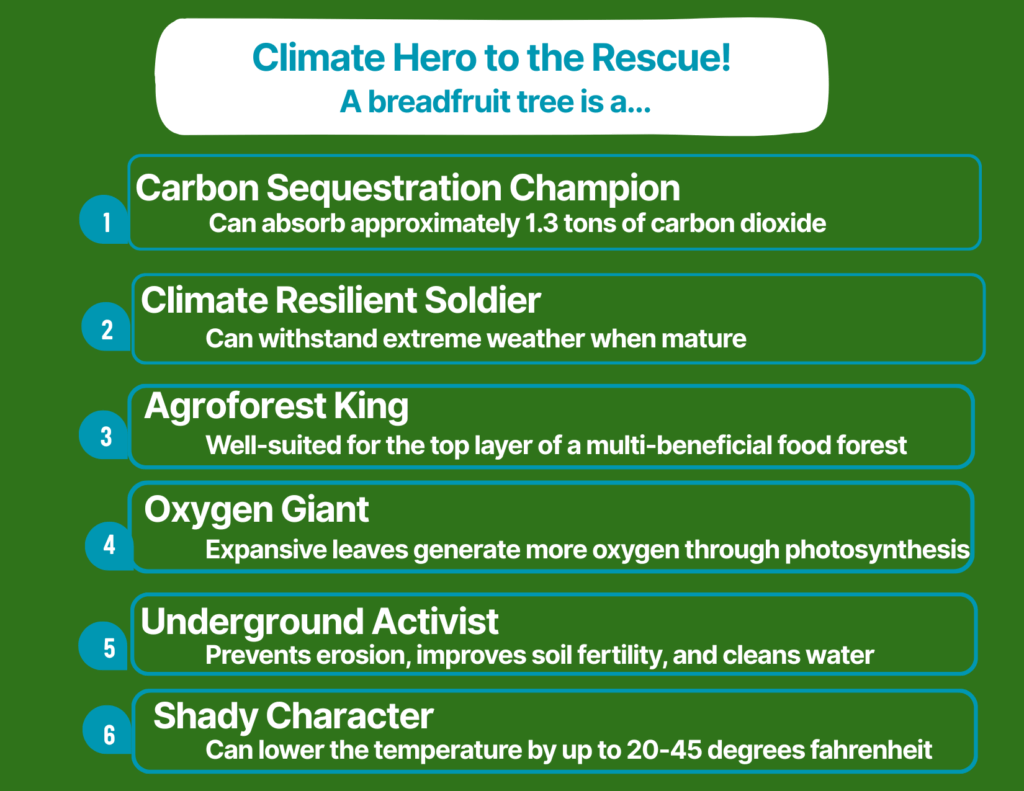At Trees That Feed Foundation, we’re often asked: Why breadfruit?
Simple. No other tree checks all the boxes like this one. Breadfruit’s unique combination of nutritional power, economic potential, and planet-friendly outcomes makes it the perfect partner in our mission to feed people, create jobs, and benefit the environment.
A Tree That Feeds
Breadfruit is one of the highest-yielding food plants on Earth. Each tree can produce hundreds of pounds of fruit per season—fresh, filling, and nutrient-dense. Even better, the fruit can be eaten right away or dried and milled into flour that stores well and serves as a versatile ingredient.
Breadfruit flour is naturally gluten-free and packed with Vitamin C, fiber, and potassium. It’s easier to digest than wheat and has a low glycemic index, making it ideal for school meals and family kitchens alike.
Forbes calls breadfruit a global future food trend, and The Atlantic says it’s remarkable!
A Tree That Creates Jobs
From seedling to plate, breadfruit drives opportunity. Farmers earn by growing and selling fruit. Entrepreneurs process and package flour. Bakers and chefs create chips, porridge, donuts, muffin mixes—and even gourmet restaurant meals.
With yields of up to 6,000 kg of flour per acre (or 6.6 tons) breadfruit outperforms crops like maize and requires less labor. Its value chain supports jobs at every level—from growers and millers to vendors and exporters. WIRED says breadfruit is here to save the world!
A Tree That Restores the Planet
Breadfruit trees are environmentally friendly and climate resilient. They thrive in hot, sunny climates, withstand droughts, and bounce back after storms. BBC calls breadfruit hurricane resistant, and Northwestern University researchers, among others, have proven its potential to make change in the world.
Each tree can live 80 to 100 years, absorbing up to 1.3 tons of carbon in its lifetime. Breadfruit trees are fantastic in agroforestry settings, providing overstory, improving soil health, reducing erosion, and supporting biodiversity.
A Tree for the Future
Originally from the Pacific, breadfruit arrived in the Caribbean in 1793. Today, it’s growing in about 90 countries, including newer adopters like Uganda, where its popularity is rising fast.
Breadfruit is propagated through methods like grafting, root culture, and tissue culture—not seeds. Once planted, trees need extra care during the first six months. After that, maintenance is low, and the rewards are high.

Breadfruit isn’t just our flagship—it’s our solution.
A solution to hunger.
A solution to poverty.
A solution to environmental decline.
When you make a gift to Trees That Feed Foundation, you’re not just planting a tree—you’re making a real difference in the world. You become part of a global movement creating food security, economic opportunity, and climate resilience. You join a growing community of proud breadfruit tree parents, helping families and ecosystems thrive for generations. Thank you!






Thank you for your information about this wonderful species. I’m from the Dominican Republic, and as an agricultural professional, I would like my country to know about the importance of this species in the areas of food, forestry, and landscaping.
That is so good to hear, Emilio! Feel free to email us at info@treesthatfeed.org.
How can we get this tree in Togo, Africa? I’m going 8n September and we have agricultural projects on going. I’d love to get this started.
Hi Rachel, Email us at info@treesthatfeed.org. We’d love to hear about your work, and we’ll be sure to respond next week.
I am glad to see this happening. I have started tree growing in karamojya region. I want to introduce breadfruit growing, I have been working with it for 3years on alarm in central.
Feel free to email us! info@treesthatfeed.org